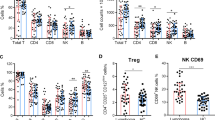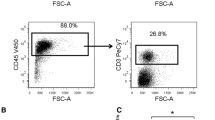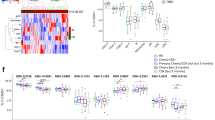Abstract
Objective
To explore the effects of dentritic cells on the peripheral blood lymphocyte subpopulations of metastatic breast cancer patients treated with chemotherapy.
Methods
The current study involved 44 metastatic breast cancer patients treated with docetaxel-based chemotherapy. Among them, 25 cases were treated with dendritic cells derived from CD34+ hematopoietic stem cells enriched autologous peripheral mononuclear cells after chemotherapy, and 19 cases received chemotherapy alone. Peripheral blood samples were collected from each patient before and after treatment, and lymphocyte subpopulations including CD3+, CD3+/CD4+, CD3+/CD8+, CD3-/CD16+56+, CD3+/CD16+56+, CD4+/CD25+, CD8+/CD28-, CD8+/CD28+, CD4/CD8, DC1, DC2 and DC1/DC2 were analysed by a 3-color flow cytometric analysis.
Results
The two treatment groups were well matched with regard to demographic and baseline disease characteristics. Comparing the changes of lymphocyte subpopulations between the two groups, it showed that the difference of the change of CD8+/CD28-lymphocyte had statistic significance. The percentage of CD8+/CD28-lymphocyte was lower in the chemotherapy+DC group, but higher in the chemotherapy-alone group.
Conclusion
As CD8+/CD28-lymphocyte represent a kind of suppressive T lymphocyte, we conclude that dentritic cell therapy can relieve immunosuppression to some extent.
Similar content being viewed by others
References
Therasse P, Piccart M, van de Velde CJ, et al. The EORTC Breast Cancer Group: 40 years of research contributing to improve breast cancer management[J]. Eur J Cancer 2002; 38(Suppl 4): S39–S43.
Slamon DJ, Leyland-Jones B, Shak S, et al. Use of chemotherapy plus a monoclonal antibody against HER2 for metastatic breast cancer that overexpresses HER2[J]. N Engl J Med 2001; 344: 783–792.
Kiessling R, Wasserman K, Horiguchi S, et al. Tumor-induced immune dysfunction[J]. Cancer Immunol Immunother 1999; 48: 353–362.
Melichar B, Touskova M, Solichova D, et al. CD4+ T-lymphocytopenia and systemic immune activation in patients with primary and secondary liver tumours[J]. Scand J Clin Lab Invest 2001; 61: 363–370.
Lissoni P, Brivio F, Ferrante R, et al. Circulating immature and mature dendritic cells in relation to lymphocyte subsets in patients with gastrointestinal tract cancer[J]. Int J Biol Markers 2000; 15: 22–25.
Melichar B, Jandik P, Krejsek J, et al. Mitogen-induced lymphocyte proliferation and systemic immune activation in cancer patients[J]. Tumori 1996; 82: 218–220.
Okita R, Saeki T, Takashima S, et al. CD4+CD25+ regulatory T cells in the peripheral blood of patients with breast cancer and non-small cell lung cancer[J]. Oncol Rep 2005;14:1269–1273.
Meloni F, Morosini M, Solari N, et al. Foxp3 expressing CD4+ CD25+ and CD8+CD28− T regulatory cells in the peripheral blood of patients with lung cancer and pleural mesothelioma[J]. Human Immunology 2006; 67: 1–12.
Shortman K, Caux C. Dendritic cell development: multiple pathways to nature’s adjuvants[J]. Stem Cells 1997; 15: 409–419.
Lespagnard L, Gancberg D, Rouas G, et al. Tumor-infiltrating dendritic cells in adenocarcinomas of the breast: a study of 143 neoplasms with a correlation to usual prognostic factors and to clinical outcome[J]. Int J Cancer 1999; 84: 309–314.
Iwamoto M, Shinohara H, Miyamoto A, et al. Prognostic value of tumor-infiltrating dendritic cells expressing CD83 in human breast carcinomas[J]. Int J Cancer 2003; 104: 92–97.
Bell D, Chomarat P, Broyles D, et al. In breast carcinoma tissue, immature dendritic cells reside within the tumor, whereas mature dendritic cells are located in peritumoral areas[J]. J Exp Med 1999; 190: 1417–1426.
Gabrilovich DI, Corak J, Ciernik IF, et al. Decreased antigen presentation by dendritic cells in patients with breast cancer[J]. Clin Cancer Res 1997; 3: 483–490.
Satthaporn S, Robins A, Vassanasiri W, et al. Dendritic cells are dysfunctional in patients with operable breast cancer[J]. Cancer Immunol Immunother 2004; 53: 510–518.
Pinzon-charry A, Ho CS, Laherty R, et al. A population of HLA-DR+ immature cells accumulate in the blood dendritic cell compartment of patients with different types of cancer[J]. Neoplasia 2005; 7: 1112–1122.
Zou W. Immunosuppressive networks in the tumor environment and their therapeutic relevance[J]. Nat Rev Cancer 2005; 5: 263–274.
Mokyr MB, Dray S. Interplay between the toxic effects of anticancer drugs and host antitumor immunity in cancer therapy[J]. Cancer Invest 1987; 5: 31–38.
Oliver RT, Nouri AM. T cell immune response to cancer in humans and its relevance for immunodiagnosis and therapy[J]. Cancer Surv 1992; 13: 173–204.
Almand B, Resser JR, Lindman B, et al. Clinical significance of defective dendritic cell differentiation in cancer[J]. Clin Cancer Res 2000; 6: 1755–1766.
Camp BJ, Dyhrman ST, Memoli VA, et al. In situ cytokine production by breast cancer tumor-infiltrating lymphocytes[J]. Ann Surg Oncol 1996; 3: 176–184.
Venetsanakos E, Beckman I, Bradley J, et al. High incidence of interleukin 10 mRNA but not interleukin 2 mRNA detected in human breast tumors[J]. Br J Cancer 1997; 75: 1826–1830.
Liyanage UK, Moore TT, Joo HG, et al. Prevalence of regulatory T cells is increased in peripheral blood and tumor microenvironment of patients with pancreas or breast adenocarcinoma[J]. J Immunol 2002; 169: 2756–2761.
Wolf AM, Wolf D, Steurer M, et al. Increase of regulatory T cells in the peripheral blood of cancer patients[J]. Clin Cancer Res 2003; 9: 606–612.
Sakaguchi S, Takagushi N, Asano M, et al. Immunologic self-tolerance maintained by activated T cells expressing IL-2 receptor alpha-chain (CD25) Breakdown of a single mechanism of self-tolerance causes various autoimmune diseases[J]. J Immunol 1995; 155: 1151–1164.
Groux H, O’Garra A, Bigler M, et al. A CD4+ T cell subset inhibits antigen-specific T cell responses and prevents colitis[J].Nature 1997; 389: 737–742.
Cortesini R, LeMaoult J, Ciubotariu R, et al. CD8+CD28- T suppressor cells and the induction of antigen-specific, antigen-presenting cell-mediated suppression of Th reactivity[J]. Immunol Rev 2001; 182: 201–206.
Scotto L, Naiyer AJ, Galluzzo S, et al. Overlap Between Molecular Markers Expressed by Naturally Occurring CD4+CD25-Regulatory T Cells and Antigen Specific CD4+CD25- and CD8+CD28- T Suppressor Cells[J]. Human Immunology 2004; 65: 1297–1306.
Filaci G, Fravega M, Fenoglio D, et al. Non-antigen specific CD8+ T supporessor lymphocytes[J]. Clin Exp Med 2004; 4: 86–92.
Filaci G, Fenoglio D, Fravega M, et al. CD8+CD28- T regulatory lymphocytes inhibiting T cell proliferative and cytotoxic functions infiltrate human cancers[J]. J Immunol 2007; 179: 4323–4334.
Chang CC, Ciubotariu R, Manavalan JS, et al. Tolerization of dendritic cells by T(S) cells: the crucial role of inhibitory receptors ILT3 and ILT4[J]. Nat Immunol 2002; 3: 237–243.
Manavalan JS, Rossi PC, Vlad G, et al. High expression of ILT3 and ILT4 is a general feature of tolerogenic dendritic cells[J]. Transpl Immunol 2003; 11: 245–258.
Shah MA, Schwartz GK. Cell cycle-mediated drug resistance: an emerging concept in cancer therapy[J]. Clin Cancer Res 2001; 7: 2168–2181.
Keilholz U, Weber J, Finke JH, et al. Immunologic monitoring of cancer vaccine therapy: results of a workshop sponsored by the society for biologic therapy[J]. J Immunother 2002; 25: 97–138.
Albert ML, Sauter B, Bhardwaj N. Dendritic cells acquire antigen from apoptotic cells and induce class I-restricted CTLs[J]. Nature 1998; 392: 86–89.
Nouri-Shirazi M, Banchereau J, Bell D, et al. Dendritic cells capture killed tumor cells and present their antigens to elicit tumor-specific immune responses[J]. J Immunol 2000; 165: 3797–3803.
Gong J, Avigan D, Chen D, et al. Activation of antitumor cytotoxic T lymphocytes by fusions of human dendritic cells and breast carcinoma cells[J]. Proc Natl Acad Sci USA 2000; 97:2715–2718.
Neidhardt-berard EM, Berard F, Banchereau J, et al. Dendritic cells loaded with killed breast cancer cells induce differentiation of tumor-specific cytotoxic T lymphocytes[J]. Breast Cancer Res 2004; 6: R322–R328.
Svane IM, Pedersen AE, Johnsen HE, et al. Vaccination with p53-peptide-pulsed dendritic cells, of patients with advanced breast cancer: report from a Phase I study[J]. Cancer Immunol Immunother 2004; 53: 633–641.
Loveland BE, Zhao A, White S, et al. Mannan-MUC1-pulsed dendritic cell immunotherapy: a Phase I trial in patients with adenocarcinoma[J]. Clin Cancer Res 2006; 12: 869–877.
Titzer S, Christensen O, Manzke O, et al. Vaccination of multiple myeloma patients with idiotype-pulsed dendritic cells: immunological and clinical aspects[J]. Br J Haematol 2000; 108: 805–816.
Morse MA, Clay TM, Colling K, et al. HER2 dendritic cell vaccines[J]. Clin Breast Cancer 2003; 3(Suppl 4): S164–S172.
Ahn JS, Krishnadas DK, Agrawal B. Dendritic cells partially abrogate the regulatory activity of CD4+CD25+ T cells present in the human peripheral blood[J]. Int Immunol 2007; 19: 227–237.
Author information
Authors and Affiliations
Additional information
This work was supported by a grant from the Beijing Capital Development Foundation for Medical Sciences(No. 2007-2053).
Rights and permissions
About this article
Cite this article
Song, Gh., Ren, J., Di, L. et al. Decrease of peripheral blood CD8+/CD28-suppressor T cell followed by dentritic cells immunomodulation among metastatic breast cancer patients. Chin. J. Cancer Res. 22, 310–315 (2010). https://doi.org/10.1007/s11670-010-0310-6
Received:
Accepted:
Published:
Issue Date:
DOI: https://doi.org/10.1007/s11670-010-0310-6




